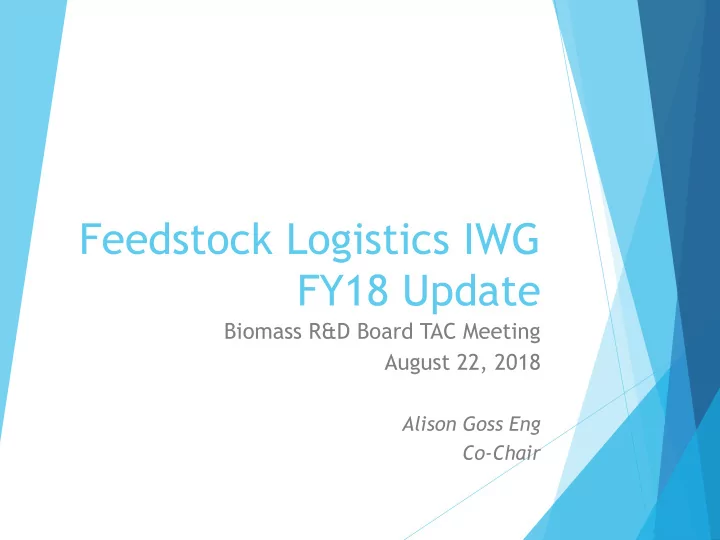

Feedstock Logistics IWG FY18 Update Biomass R&D Board TAC Meeting August 22, 2018 Alison Goss Eng Co-Chair
FY18 and FY19 Key Activities Contribute to finalizing the Feedstock Logistics R&D section of the Bioeconomy Initiative: Implementation Framework . (completed) Improve awareness across the IWGs by sharing information about agency-led efforts underway on feedstock logistics (ongoing) Increase IWG membership (ongoing) Begin development of a framework for easily-accessible, nationwide data on feedstock characteristics and attributes with management applications. (planned) Begin development of standard costing procedures and cost- rate models for individual equipment and systems. (planned) 2
FY18 and FY19 Key Activities (continued) Develop a framework for • Encourage data collection and easily- reporting of county-level potential of accessible, raw biomass materials. nationwide • Coordinate agencies working to optimize regional MSW supply data on chains, and enhance/maintain MSW feedstock feedstock quality through logistics characteristics optimization. and attributes • Collaborate with other IWGs to ensure data centralization and with information dissemination. management applications. 3
FY18 and FY19 Key Activities (continued) Develop • Develop partnerships with equipment manufacturers to establish appropriate standard equipment design and design criteria, and develop new, efficient preprocessing methods to costing meet biorefinery requirements. procedures • Provide operational cost analyses that demonstrate current, intermediate, and long- and cost-rate term targeted costs. • Ensure that models include workforce analysis models for components to assess the availability of the workforce and the wages paid for similar work. individual • Develop outreach events such as listening days, equipment seminars, workshops, and presentations to a diverse audience across the federal government, and systems. academia, and industry. 4
Key Accomplishments in FY18 • USFS Wood Innovations Grants – Southern Group of State Foresters/Utilization and Marketing committee working USFS to train state departments of forestry to use a Sub- regional timber supply model developed by Bob Abt. Currently applicable to the southeastern region but could be applied more broadly – Texas A&M/Forestry is developing a web-based model to forecast wood volumes (including biomass) at a variety of scales. This began in TX but is planned to be adapted to all southern States. – Recently the National Wood Chip Standard was released. Could influence feedstock that would otherwise go to landfills. https://www.woodchipstandard.org/ • The Forest Inventory and Analysis (FIA) program is collaborating with the USFS Southern Research Station - Forest Products Utilization Research Unit, and a variety of universities to develop nationally compatible volume/biomass/carbon models. 5
Key Accomplishments in FY18 • NIFA 2018 FOA on Feedstock Logistics as part of the Agriculture and Food Research Initiative Foundational and Applied Research Program. (Anticipate making five $1M awards) • Three active NIFA Coordinated Agricultural Projects with robust feedstock logistics components 1. BANR (Colorado State, insect damaged conifers) working with Confluence Energy and Cool Planet 2. SBAR (U Arizona, guayule and guar) working with Bridgestone America. 3. SPARC (U Florida, Brassica carinata) working with Agrisoma and ARA on AJF 6
Key Accomplishments in FY18 • DOE BETO initiated the Feedstock-Conversion Interface Consortium – Leverages the capabilities and expertise at 8 national labs (INL, NREL, ORNL, PNNL, LBNL, ANL, SNL, LANL) to gain fundamental understanding of how biomass variability and quality affects biorefinery operational reliability. Selected accomplishments • Developed and improved analytical methods for biomass properties (surface energy, spectroscopy compositional analysis, rheological properties, particle size distribution, particle shape, feeding and shear testing, etc.) • Initiated novel simulations to model biomass dynamic properties through bins, augers and hoppers; performed experiments to verify pressure and shear forces aimed at improved flowability of biomass materials. • Implemented adaptive control system designs and instrumentation for real-time response and controls between feedstock properties and unit operations. • Established industry/national laboratory partnerships in three areas: • Biomass Quality Evaluation and Optimization • Process Integration and Advanced Control Development 7 • Techno-economic Analysis
Further questions, or for more information: Alison Goss Eng, PhD Program Manager Bioenergy Technologies Office BRD Feedstock Logistics IWG Co-Chair U.S. Department of Energy (202) 586-9109 Alison.GossEng@ee.doe.gov www.linkedin.com/in/alisongosseng www.twitter.com/AlisonGossEng www.twitter.com/BioenergyKDF www.bioenergykdf.net 8
Recommend
More recommend